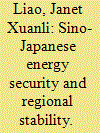| Srl | Item |
| 1 |
ID:
178750


|
|
|
|
|
| Summary/Abstract |
China’s oil investment in Central Asia from the late 1990s was not driven by energy needs or geopolitical ambitions, like many assumed. The real concern was the safety of its western boundary, while energy was used as an instrument to forge political ties with its neighbours. However, China has become one of the key geopolitical players in Central Asia after more than 20 years engagement, and many observers are keen to find out why has Beijing failed to escape the grand games while focusing on energy diplomacy? And, what is the implications of China’s new status in Central Asia on its Belt and Road Initiative (BRI)? This article attempts to answer the questions via reviewing China’s energy diplomacy towards Central Asia, from the lens of geopolitics. Focusing on China’s dealing with Kazakhstan and Turkmenistan, as well as the Russian factor, the research has revealed the main reasons that led China into the grand games: the entangling of politics and China’s energy engagements; the establishment of the Shanghai Cooperation Organization; and the changes of the pipeline map. China’s geopolitical gains have mainly made at the cost of Russia, though the latter chose to accept Beijing’s greater presence in Central Asia against the changed circumstances. The launch of the BRI scheme has amplified China’s geopolitical significance in Central Asia, but also triggered various criticisms, including the debt traps and governance-related issues. China’s dealing with the Muslims in Xinjiang was also a point of disagreement. Beijing may need to revisit its pragmatic featured diplomacy, and to take a more liberal approach to accommodate different political perspectives. With greater power potential, Beijing should bear more responsibilities to ensure peace and stability in Central Asia, together with other powers, not only for the sake of BRI’s success, but also for the interest of the mankind.
|
|
|
|
|
|
|
|
|
|
|
|
|
|
|
|
| 2 |
ID:
082388


|
|
|
|
|
| Publication |
2008.
|
| Summary/Abstract |
The Sino-Japanese dispute over the East China Sea maritime resources was triggered by the unsettled maritime boundary and the territorial dispute over the Diaoyu/Senkaku Islands. The dispute has been ascribed by many to intensified competition between China and Japan over energy supply. However this article attributes the fundamental cause of the conflict to power politics and political distrust, which are deemed to have the key role in preventing the two governments from finding a solution. The article analyses the origin and the causes responsible for the Sino-Japanese dispute over the East China Sea gas exploration, and then proceeds to investigate the diplomatic dialogues to reveal the key obstacles in the process.
|
|
|
|
|
|
|
|
|
|
|
|
|
|
|
|